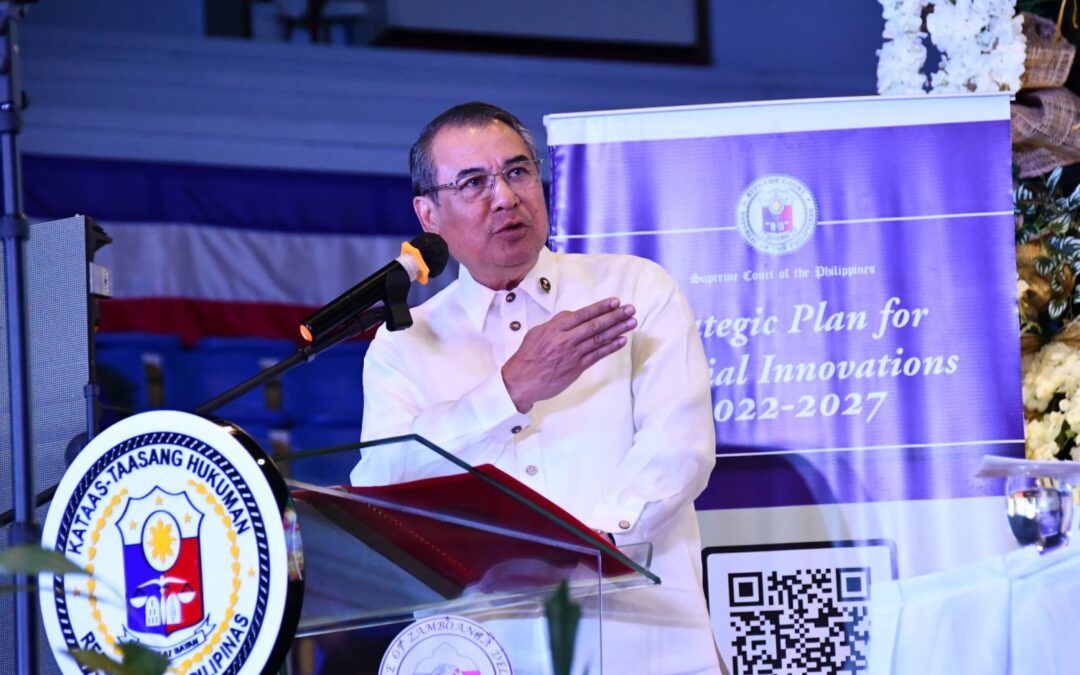Chief Justice Alexander G. Gesmundo speaks before court stenographers on the first day of the 9th National Convention of the Court Stenographers Association of the Philippines on April 26, 2023 in Dipolog City, Zamboanga del Norte.
“Hindi uusad ang ating mga kaso—at karugtong nito, hindi uusad ang hustisya—kung wala ang trabahong ginagawa ninyong mga court stenographers.”
Thus remarked Chief Justice Alexander G. Gesmundo during his keynote speech on the first day of the 9th National Convention of the Court Stenographers Association of the Philippines (COSTRAPHIL) on April 26, 2023 in Dipolog City, Zamboanga del Norte.
Addressing over 1,800 court stenographers from all over the country, the Chief Justice stressed the indispensable role of court stenographers in the justice system: “Higit pa sa pagtala ng mga kaganapan at proseso sa paglilitis ng ating mga korte, mayroong mas malalim na responsibilidad na ginagampanan ang ating court stenographers. You help ensure that truth and reason prevail in our courts, and, in turn, our country. In performing your tasks efficiently and effectively, you help win back our people’s faith in our legal system.”
Under Rule 136, Section 17 of the Rules of Court, stenographers are mandated to deliver to the clerk of court immediately after a court session all notes taken, to be attached to the records of the case.
At present, there are over 7,000 court stenographers in the Philippines.
Acknowledging the challenges faced by court stenographers, Chief Justice Gesmundo shared the Supreme Court’s blueprint for judicial reform, which targets the outcomes of Efficiency, Innovation, and Access. “The plight of our court stenographers is something the Supreme Court has taken into account in laying out a path for reform through innovation under the Strategic Plan for Judicial Innovations 2022-2027 or the SPJI.”
The Chief Justice added, “The SPJI will, among others, allow us to capitalize on artificial intelligence not just for court operations, but for stenographic work—which, in turn, will facilitate the speedy disposition of cases… We can harness AI-enabled voice-to-text transcription services to make stenographic work more efficient and more effective.”
The Chief Justice noted that such efforts have already begun, with the issuance on July 28, 2021, of Office of the Court Administrator Circular No. 107-2021, which encouraged the use of the Live Transcription feature of the Philippine Judiciary 365 platform during videoconferencing hearings.
Chief Justice Gesmundo also addressed apprehensions of downsizing and layoffs presumed to result from digitization and automation: “When we talk of pushing the Judiciary forward through innovation, we mean exactly that—to propel the Judiciary, in its entirety, forward. That means bringing everyone, including our court stenographers, in tow. Sa maikling salita: sa SPJI, sisiguruhin nating walang mapag-iiwanan.”
In closing, Chief Justice Gesmundo implored the court stenographers to support the SPJI: “I call on our court stenographers to fully embrace technology in the performance of your duties, especially as we pursue reform through innovation. Harness it to work more efficiently and expeditiously. Invest in the skills and resources needed to enable the shift that we envision. Be active agents of reform, bearing in mind that these innovations are meant not to supplant us, but to support us.”
Also present was Supreme Court Associate Justice Jose Midas P. Marquez, who acknowledged and thanked the support court stenographers have given to ensure the administration of justice in the country: “Your active participation and enthusiasm in various Court programs and initiatives certainly impelled the Judiciary, through our trial courts, to adapt, evolve, and keep up with the changing times. So, too, are the initiatives, which you yourselves have devised, proved instrumental in the Court’s progression toward meaningful change.”
Court Administrator Raul B. Villanueva and Deputy Court Administrator Leo T. Madrazo also spoke at the Convention, emphasizing the vital position of court stenographers, who make up one-fifth of the Judiciary, in the administration of justice.
The three-day Convention included lectures to enhance the knowledge and skills of court stenographers. Among the lecturers were Assistant Court Administrator (ACA) Lilian Barribal-Co, who spoke on the Code of Conduct for Court Personnel, which states the obligations, duties, and responsibilities of all employees in the Judiciary. ACA Barribal-Co explained the duties required under the Code’s Cannons of Fidelity to Duty; Confidentiality; Conflict of Interest; and Performance of Duties.
ACA Maria Regina Adoracion Filomena M. Ignacio also gave a presentation on the duties and functions of court stenographers and the need to preserve the confidentiality of court records. ACA Ignacio also discussed the standards required of court stenographers in the performance of their functions as stated in various court issuances and as illustrated in jurisprudence.
Speaking on the Court’s digital transformation journey, Deputy Clerk of Court and Chief Technology Officer Jed Sherwin G. Uy shared the launch of the Judiciary Electronic Payment Solution, which serves as an online assessment and payment facility for court fees. He also discussed the Court’s plans to further modernize administrative processes with the target implementation of the Human Resource Information System and the Financial Management Information System within 2023 and 2024. (Courtesy of the Supreme Court Public Information Office)

